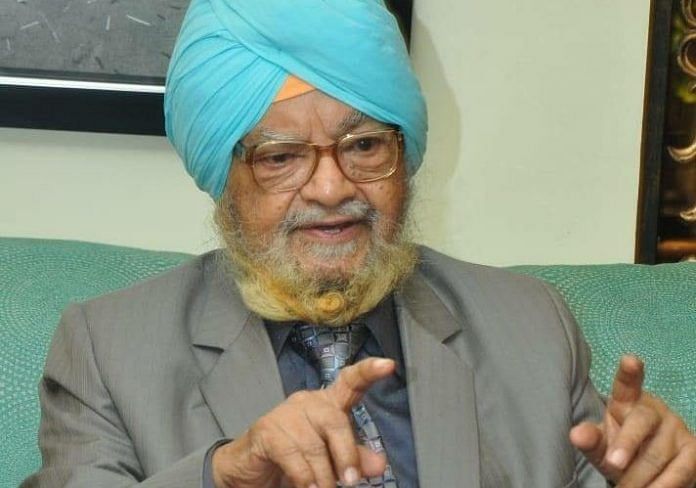Sardar Saran Singh, 95, speaks about how things have changed for the civil service in the 71 years since independence.
New Delhi: At a time when there is debate over whether Indian civil servants are ceding ground to their political masters, Sardar Saran Singh, one of the country’s oldest living IAS officers at 95, said political pressure on bureaucrats is as old as Indian bureaucracy itself.
In an interview to ThePrint, Singh recalled the pressures he had to resist decades ago in order to perform his duties.
“At a meeting with his department officials, a minister in charge spoke so harshly, and rebuked the officers without having understood the problems being faced by the department,” he said, without naming the minister.
“At this point, I (then secretary of the department) snubbed the minister and objected to his aggressive handling of the officers. The minister promptly went to the chief minister and complained about me and I was promptly shifted to another department.”
Also read: Top retired IAS, IFS officers join cushy corporate boards, some in sectors they regulated
Patience is a rare quality
Singh’s journey as a bureaucrat ran parallel to the history of the civil services in Independent India. This was why the West Bengal IAS Association felicitated him on his 95th birthday earlier this month. Singh now lives in Kolkata, and was communicating through his nephew, Satnam Singh Ahluwalia.
When he was preparing for the civil services exam back in 1947, it was still called the Imperial Civil Services. When he took the exam, independence had dawned, bringing in its wake the horrific spectre of Partition — which compelled Singh, who was born in Peshawar, to move from Lahore to Delhi.
A Bihar cadre officer of the 1948 batch, Singh has seen the services evolve since the time officers facilitated India’s historic first general election in 1952, which they did while moving from booth to booth on foot or by cart.
“Times have changed. Systems, too, have changed for the better. I was privileged to serve the government of India for 35 years,” Singh said.
“Today, technology has completely reinvented itself. The availability of information is an aid that helps officers be more vigilant and alert. The attitude to social issues has become more vibrant. There are more complex administrative problems demanding attention today.”
However, the civil services have their problems too, he said. “The chemistry of the personnel in the current dispensation seems to have changed. Patience is a rarely practiced virtue,” he said.
Singh served as the secretary in the ministries of steel, social welfare and textiles before retiring from the service in 1981. “Dr Manmohan Singh and I were appointed as secretaries at the same time. We were the only men with turbans at the time,” he said.
Post-retirement career
Singh was appointed adviser to the governor of Assam from 1981-1982, at a time when the state was under President’s Rule.
“After retirement, he immersed himself in welfare work for Sikhs completely,” said his nephew Ahluwalia. “He has edited several Sikh magazines and continues to be an editor of a magazine called Sikh Review even at this age. He calls the Sikh Review his labour of love.”
In 2011, Singh went on to be conferred with the Shiromani Sikh Lekhak Sanmaan by Sri Akal Takht Sahib in Amritsar, the highest temporal seat of the Sikhs.
Also read: Quietly, Modi govt ‘hides’ list of IAS, IFS, IPS officers eligible for Delhi posts
He had an integral role in the formation of the World Sikh Council, an elected body of gurdwaras and Sikh institutions across the world, catering to the religious and educational needs of the Sikh community.
For a 95-year-old, Singh is still in good health. “In fact, he only stopped playing golf 6-7 years ago when his doctor asked him to stop,” Ahluwalia said.




Prof PK Sharma, Freelance Journalist,Barnala (Punjab)
Sardar Saran Singh, a living legend of Indian bureaucracy deserves our salutations !
He is hale and hearty at this age is something very exceptional in the modern world !
Then he is a personality having all the qualities of head as well as heart !
A wonderful source of inspiration for society in general and bureaucracy in particular,
his tip of PATIENCE to the present day bureaucracy is worth appreciating !
That is why it remains a universal fact because
” A man who is a MASTER of patience is master of EVERYTHING ” !
Prof PK Sharma, Freelance Journalist
Pom Anm Nest,Barnala (Punjab)
Civil servants can bring drastic changes in the lives of the people, provided that they work selflessly, without fear or favor-which they are duty bound to do. But not many of them stand up to the unreasonable demands and pressures of their semi-literate political bosses and many of them don’t remain honest thereafter.
The present day IAS officers first need to be independent and try to learn the subject they are dealing with. Instead of learning the subject, they learn the weakness of their bosses, either political or official, and while away the time. Most of the high value corruption cases are only due to connivance and greed of IAS. This should stop.
Inspired one analysis.
Respected Sir, We wish that you must complete more than 111 years with good health. Wishing you good health.
Keep it up